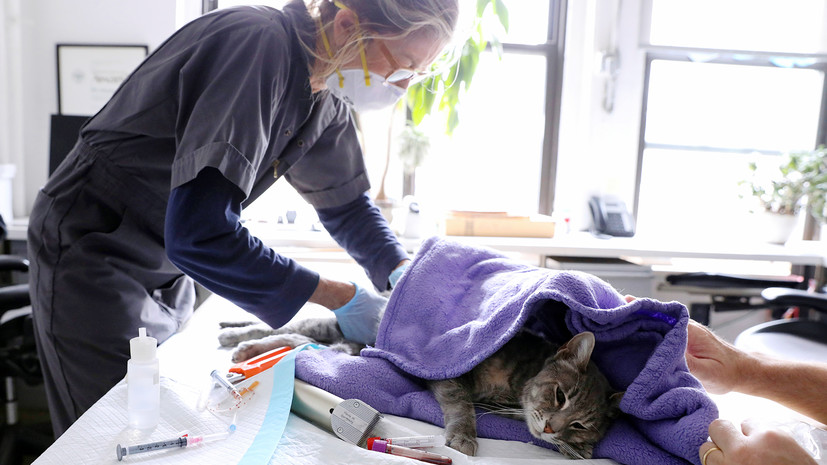The possibility that cats and dogs will be infected from humans with a coronavirus infection of COVID-19 is greatly exaggerated, although isolated cases have been noted. This opinion was expressed in an interview with RT by a veterinarian of the highest category Mikhail Shelyakov. However, according to him, the issue of the circulation of the disease should be considered because of the possible danger of COVID-19 transfer by domestic or street animals.
“They may not be infected or transmitted to humans, but may be an external factor in the transmission of infection. For example, you went for a walk with a dog, she came close to a coronavirus-infected person, and when you got home, your child stroked the dog and then his face, after which the infection occurs. Here is the transmission factor: the animal turned out to be immune, but it transferred the pathogen to the coat. This is a more urgent problem, ”explained Shelyakov.
According to him, the virus can persist for a long time on the hair of animals, so pets need to wash their feet and periodically do preventive vaccinations.
“You should not kiss the animal, no matter how domestic it is. The general recommendation is that if a person has a coronavirus, it means that you need to protect the person from communication with a pet, to keep a distance, ”explained Shelyakov.
To gallery page
In turn, a veterinarian Yevgeny Tsyplenkov in a conversation with RT added that coronavirus infection of COVID-19 in domestic animals proceeds according to the same scenario as in humans.
“Dry cough, lethargy, mild fever, and then it all goes away,” he explained.
The problem of coronavirus infection of domestic animals has already been dealt with by various scientific teams, recalled in an interview with RT the head of the virus ecology laboratory of the Research Center for Fundamental and Translational Medicine Kirill Sharshov.
In particular, immunity arising in humans from coronaviruses of dog and bull viruses was reported on March 17, 2020 in the journal Microbes and Infection. Also, according to the scientist, sporadic cases of coronavirus infection in dogs were described by Hong Kong veterinarians in the journal Veterinary Record on March 27, 2020.
According to Kirill Sharshov, there are not so many similar publications, but now, according to the data presented in them, it can be concluded that “pets do not participate in the active circulation of the SARS CoV-2 coronavirus as carriers”.
“A rare sporadic infection of animals from humans or humans from animals is possible, but it does not really matter in the epidemiological situation as a whole. You don’t need to go to the “crusade” against pets! ” - reassures pet owners a Russian virologist.
Moreover, according to Sharshov, in certain specific cases, the role of domestic animals as a carrier of the virus is quite likely. For this reason, isolation and disinfection of pets can be used within reasonable limits.
Pets have their own coronavirus, in particular in cats, Mikhail Shelyakov stated. According to him, if you test all cats, both domestic and outdoor, approximately 80% will have positive coronavirus test results.
“They carry it in themselves, in cases rare for cats, the coronavirus begins to“ drive their body crazy, ”for unknown reasons, infectious peritonitis begins, and one-hundred-percent mortality. If for some reason the virus activated, started to mutate, then there is no escape from it, ”the expert noted.
At the same time, Evgeny Tsyplenkov added that Chinese experts conducted a study in one of the cities regarding the infection of cats and dogs with COVID-19. According to him, about 30% of the cat population gave a positive result, while in dogs the tests were negative.
“Judging by how the disease went in these cats, if there were the same chain reaction and grave consequences as in humans, then we would know about it. Probably, in cats, the virus clung to a not very active protein, so there wasn’t such a terrible outbreak of mortality, ”added the source.
Meanwhile, Mikhail Shelyakov noted that according to the data that are still undergoing the necessary sampling, pets with coronavirus can help the owner acquire a kind of immunity to the disease.
“Perhaps people with coronavirus animals will be less susceptible to COVID-19. For comparison, the same situation with the flu, we know a lot of its types, every year new, so the flu vaccine does not give absolute protection, because new strains appear, but the person either tolerates the disease more easily or does not get sick at all, ”noted Shelyakov .
In this regard, the head of the laboratory of biotechnology and virology at Novosibirsk State University, Doctor of Biological Sciences Sergey Netesov said that cats, as well as ferrets, can both get coronavirus and be carriers, but there is no evidence that they can threaten people with COVID-19 infection.
“From cats to humans has not yet been proven. From cats to cats has already been proven, ”he explained.
At the same time, according to him, the available information on checking animals, including domestic ones, indicates that among dogs, chickens, ducks, pigs, the virus "almost does not multiply."

